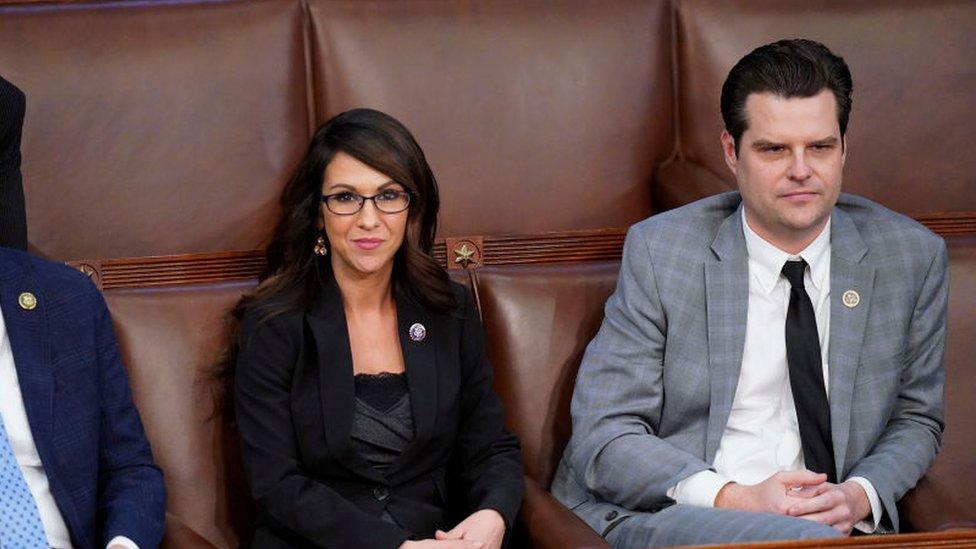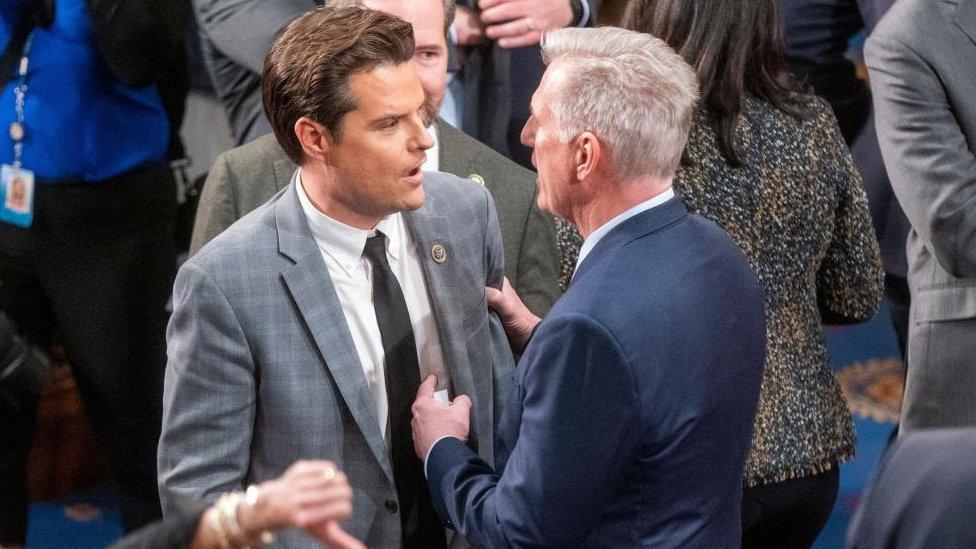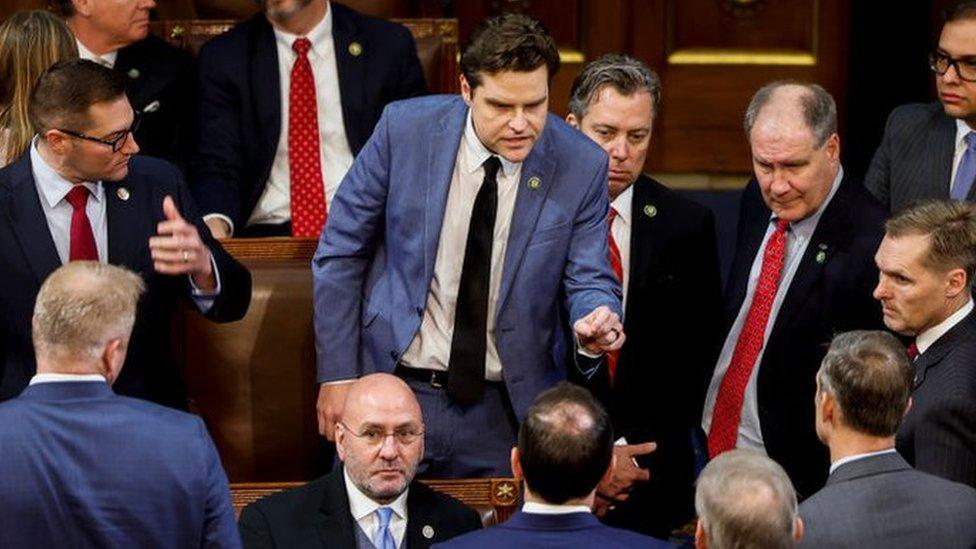The key committee spots given to Kevin McCarthy's far-right critics
- Published

Matt Gaetz and Lauren Boebert have been staunch McCarthy critics
Two weeks ago, Kevin McCarthy scratched and clawed for days to round up the support he needed among his fellow Republicans to be elected Speaker of the House of Representatives. It took a modern record of 15 ballots over four days, but in an after-midnight vote following a near brawl on the floor of the chamber, he prevailed.
To win over the 21 Republicans who were blocking his path to the gavel, the California congressman made a number of significant concessions, some publicly revealed and others kept private.
They included allowing conservative hardliners to set many of his party's policy priorities, agreeing to push for massive cuts to government spending and making it easier to force a vote to remove him from the speakership.
Perhaps the most tangible reward for the hard-line holdouts is only now beginning to come into focus, however. Legislative power is not wielded on the floor of the House of Representatives, but in congressional committees, where influence flows in public hearings and closed-door meetings.
In the run-up to the Speaker vote, some McCarthy opponents said they had been warned that their intransigence would lead them to be stripped of their committee seats, effectively excommunicating them from the party.
Instead, his most vocal critics from early January are landing in some influential perches.
Here's a look at the key committee assignments the Republican rebels have been given - and what it could mean for the House of Representatives for the next two years.
The Biden watchdogs
The Government Oversight committee, the House's primary investigatory panel, is poised to be a prime source of action in the new Republican-controlled chamber. Chair James Comer has already promised to use his power to launch investigations into Joe Biden's administration, including inquiries into the origins of the coronavirus pandemic; the 2021 US withdrawal from Afghanistan; the personal finances of the president and his son Hunter; and the handling of classified documents recently discovered at the president's Delaware home and in a former office in Washington, DC.
Given the confrontational nature of the committee, it's no surprise that many of Mr McCarthy's most animated opponents - who have criticised him for being insufficiently aggressive in confronting Democrats - sought spots on this committee. Plenty of them got their wish, ensuring that upcoming oversight hearings are going to be particularly unpleasant for Mr Biden and the Democrats.
McCarthy holdouts Lauren Boebert, Scott Perry, Paul Gosar, Anna Paulina Luna and Byron Donalds are all on the panel. So is Marjorie Taylor Greene, the conspiracy-minded Georgia congresswoman. When they were in the majority, Democrats had stripped of her committee assignments because of past anti-Semitic comments and suggestions of violence against Democratic officials.
The cradle of impeachment
The House Judiciary committee could become another prominent stage in the days ahead, given that it is tasked with initiating any impeachment inquiries against administration officials.
There have already been multiple calls among Republican hardliners for the impeachment of Homeland Security Secretary Alejandro Mayorkas for his handling of the surge of undocumented migration at the US-Mexico Border. The first Judiciary committee hearing into the matter could come within a month.
If the House ever decides to bring impeachment proceedings against Mr Biden - certainly a possibility given the depth of Republican animus toward the president - they would start in the Judiciary, which is chaired by outspoken Biden critic Jim Jordan of Ohio.
Florida Congressman Matt Gaetz, the ringleader of the anti-McCarthy effort two weeks ago, received an appointment to the committee, as did Chip Roy of Texas; Victoria Spartz of Indiana; Dan Bishop of North Carolina; and Andy Biggs, the Arizona congressman who was a close confidante to Donald Trump during his attempts to challenge his 2020 presidential election defeat.
Newfound power and ruffled feathers
Republican holdouts also ended up on a number of other less visible but equally important committees.
Mr Donalds of Florida, who stood in as Mr McCarthy's rival for the speakership, landed on the Steering Committee, which doles out committee assignments to the House rank-and-file. He and several other Republican rebels are also on the Financial Services Committee, which oversees banking (and thus opens the door to very deep-pocketed political donors).
Mike Cloud of Texas and Andrew Clyde of Georgia were given new seats on the Appropriations Committee, which manages all government spending. Andy Harris of Maryland was elevated to chair of its agriculture and drug subcommittee. There's no better place for the hard-line budget-cutters who made up the bulk of Mr McCarthy's opposition to exert their influence.
The reshuffling of seats has not been without risk for Mr McCarthy, however. With only a four-seat majority in the House, the new Speaker has to keep his fellow Republicans happy - which has not always been easy. Vern Buchanan of Florida - who was next in line according to seniority to become chair of the powerful House Ways and Means tax-writing committee - reportedly was furious that he was passed over for the spot by a close McCarthy ally.
According to an account in Puck News, Mr Buchanan accused Mr McCarthy of orchestrating the snub in an obscenity-laced diatribe - and he threatened to resign in protest, giving the Speaker an even narrower House majority.
More stories of disaffection within the ranks could emerge as the new balance of power in the House sinks in and the Speaker attempts not just to hold on to power, but exercise it effectively.
- Published7 January 2023

- Published6 January 2023

